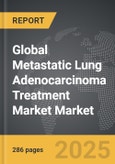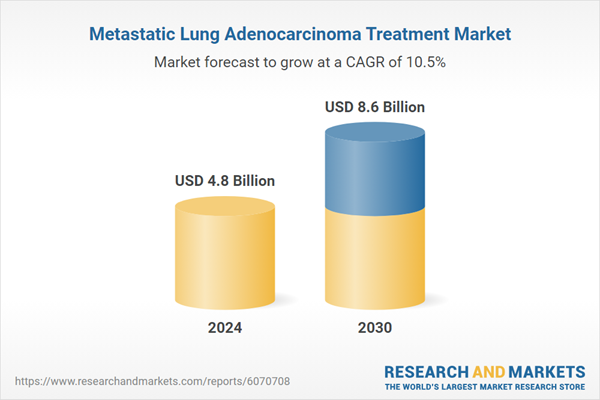Global Metastatic Lung Adenocarcinoma Treatment Market - Key Trends & Drivers Summarized
What is Metastatic Lung Adenocarcinoma and How is It Treated?
Metastatic lung adenocarcinoma is a late-stage form of non-small cell lung cancer (NSCLC), where the cancer originating in the lungs spreads (metastasizes) to distant organs such as the brain, bones, liver, or adrenal glands. It is the most common subtype of NSCLC, accounting for nearly 40-50% of all lung cancer cases. The disease is particularly aggressive at this stage and often requires a multimodal treatment approach that includes systemic therapies rather than localized interventions such as surgery or radiotherapy. The primary treatment goals for metastatic cases are to slow disease progression, prolong survival, and improve or maintain the patient's quality of life.Treatment strategies are highly individualized and increasingly guided by molecular and genetic profiling of tumors. Targeted therapies, immune checkpoint inhibitors, and advanced chemotherapy regimens form the core of contemporary treatment plans. Drugs that target specific mutations such as EGFR, ALK, ROS1, and BRAF have significantly changed outcomes for subsets of patients, offering higher response rates and extended progression-free survival. Immunotherapies - particularly PD-1 and PD-L1 inhibitors - have also emerged as frontline treatments, either alone or in combination with chemotherapy, especially for patients without actionable mutations. As understanding of tumor biology deepens, treatment protocols are continuously evolving to align with patient-specific characteristics.
How is the Market Evolving with Technological and Clinical Advancements?
The treatment landscape for metastatic lung adenocarcinoma has undergone a paradigm shift over the past decade, driven by breakthroughs in precision oncology, companion diagnostics, and drug development. The emergence of liquid biopsies and next-generation sequencing (NGS) technologies has enabled oncologists to detect actionable genetic alterations non-invasively, allowing for timely and accurate therapy selection. These innovations are reducing the time to treatment and minimizing the risk of ineffective therapies, a critical factor in managing fast-progressing metastatic disease.In parallel, the pharmaceutical pipeline has expanded rapidly, with numerous novel agents targeting a wider range of molecular mutations currently in late-stage clinical trials or recently approved. Agents like KRAS G12C inhibitors, MET inhibitors, and RET fusion-targeting drugs are adding new dimensions to personalized treatment. Furthermore, combination strategies - such as pairing immune checkpoint inhibitors with anti-angiogenic agents or chemotherapy - are demonstrating improved overall survival in clinical trials, reshaping standard-of-care algorithms. The market is also seeing increasing interest in tumor microenvironment modulation and T-cell engagers, pointing to a future where treatment is not only mutation-specific but also deeply integrated with immunologic responses.
The Growth in the Metastatic Lung Adenocarcinoma Treatment Market is Driven by Several Factors
The growth in the metastatic lung adenocarcinoma treatment market is driven by several factors, primarily the increasing global incidence of lung cancer, particularly in aging populations and among smokers in developing regions. Rising awareness, improved screening programs, and better diagnostic infrastructure are leading to more accurate and earlier detection of metastasis, thereby expanding the pool of patients eligible for advanced systemic therapies. Moreover, the identification of actionable genetic mutations in a growing proportion of lung cancer patients has enabled targeted therapy to be applied more broadly, driving both innovation and uptake of precision medicines.Technological advancements in diagnostic tools, especially the rapid adoption of liquid biopsies and comprehensive genomic profiling, are facilitating more personalized treatment regimens and improving patient outcomes. In addition, favorable regulatory frameworks and accelerated approval pathways in key markets such as the U.S., Europe, and China are enabling faster market entry for innovative oncology drugs. Strong investment from biopharmaceutical companies in R&D, increasing collaboration between academia and industry, and expanding healthcare coverage in emerging economies are also contributing to market expansion. Collectively, these drivers are fueling the demand for more effective, less toxic, and patient-centric treatment solutions in the global metastatic lung adenocarcinoma space.
Report Scope
The report analyzes the Metastatic Lung Adenocarcinoma Treatment market, presented in terms of market value (US$). The analysis covers the key segments and geographic regions outlined below:- Segments: Treatment (Chemotherapy, Targeted Therapy, Immunotherapy, Radiation Therapy, Others); End-Use (Hospitals, Specialty Clinics, Others).
- Geographic Regions/Countries: World; United States; Canada; Japan; China; Europe (France; Germany; Italy; United Kingdom; Spain; Russia; and Rest of Europe); Asia-Pacific (Australia; India; South Korea; and Rest of Asia-Pacific); Latin America (Argentina; Brazil; Mexico; and Rest of Latin America); Middle East (Iran; Israel; Saudi Arabia; United Arab Emirates; and Rest of Middle East); and Africa.
Key Insights:
- Market Growth: Understand the significant growth trajectory of the Chemotherapy segment, which is expected to reach US$2.6 Billion by 2030 with a CAGR of a 8.3%. The Targeted Therapy segment is also set to grow at 12.5% CAGR over the analysis period.
- Regional Analysis: Gain insights into the U.S. market, valued at $1.3 Billion in 2024, and China, forecasted to grow at an impressive 13.9% CAGR to reach $1.7 Billion by 2030. Discover growth trends in other key regions, including Japan, Canada, Germany, and the Asia-Pacific.
Why You Should Buy This Report:
- Detailed Market Analysis: Access a thorough analysis of the Global Metastatic Lung Adenocarcinoma Treatment Market, covering all major geographic regions and market segments.
- Competitive Insights: Get an overview of the competitive landscape, including the market presence of major players across different geographies.
- Future Trends and Drivers: Understand the key trends and drivers shaping the future of the Global Metastatic Lung Adenocarcinoma Treatment Market.
- Actionable Insights: Benefit from actionable insights that can help you identify new revenue opportunities and make strategic business decisions.
Key Questions Answered:
- How is the Global Metastatic Lung Adenocarcinoma Treatment Market expected to evolve by 2030?
- What are the main drivers and restraints affecting the market?
- Which market segments will grow the most over the forecast period?
- How will market shares for different regions and segments change by 2030?
- Who are the leading players in the market, and what are their prospects?
Report Features:
- Comprehensive Market Data: Independent analysis of annual sales and market forecasts in US$ Million from 2024 to 2030.
- In-Depth Regional Analysis: Detailed insights into key markets, including the U.S., China, Japan, Canada, Europe, Asia-Pacific, Latin America, Middle East, and Africa.
- Company Profiles: Coverage of players such as AbbVie Inc., Amgen Inc., AstraZeneca, Bayer AG, BioNTech SE and more.
- Complimentary Updates: Receive free report updates for one year to keep you informed of the latest market developments.
Some of the 43 companies featured in this Metastatic Lung Adenocarcinoma Treatment market report include:
- AbbVie Inc.
- Amgen Inc.
- AstraZeneca
- Bayer AG
- BioNTech SE
- Boehringer Ingelheim
- Bristol-Myers Squibb
- Celgene Corporation
- Eli Lilly and Company
- GlaxoSmithKline plc
- GSK plc
- Johnson & Johnson
- Merck & Co., Inc.
- Novartis AG
- Pfizer Inc.
- Regeneron Pharmaceuticals
- Roche
- Sanofi
- Summit Therapeutics
- Takeda Pharmaceutical Company
This edition integrates the latest global trade and economic shifts into comprehensive market analysis. Key updates include:
- Tariff and Trade Impact: Insights into global tariff negotiations across 180+ countries, with analysis of supply chain turbulence, sourcing disruptions, and geographic realignment. Special focus on 2025 as a pivotal year for trade tensions, including updated perspectives on the Trump-era tariffs.
- Adjusted Forecasts and Analytics: Revised global and regional market forecasts through 2030, incorporating tariff effects, economic uncertainty, and structural changes in globalization. Includes historical analysis from 2015 to 2023.
- Strategic Market Dynamics: Evaluation of revised market prospects, regional outlooks, and key economic indicators such as population and urbanization trends.
- Innovation & Technology Trends: Latest developments in product and process innovation, emerging technologies, and key industry drivers shaping the competitive landscape.
- Competitive Intelligence: Updated global market share estimates for 2025, competitive positioning of major players (Strong/Active/Niche/Trivial), and refined focus on leading global brands and core players.
- Expert Insight & Commentary: Strategic analysis from economists, trade experts, and domain specialists to contextualize market shifts and identify emerging opportunities.
Table of Contents
Companies Mentioned (Partial List)
A selection of companies mentioned in this report includes, but is not limited to:
- AbbVie Inc.
- Amgen Inc.
- AstraZeneca
- Bayer AG
- BioNTech SE
- Boehringer Ingelheim
- Bristol-Myers Squibb
- Celgene Corporation
- Eli Lilly and Company
- GlaxoSmithKline plc
- GSK plc
- Johnson & Johnson
- Merck & Co., Inc.
- Novartis AG
- Pfizer Inc.
- Regeneron Pharmaceuticals
- Roche
- Sanofi
- Summit Therapeutics
- Takeda Pharmaceutical Company
Table Information
| Report Attribute | Details |
|---|---|
| No. of Pages | 286 |
| Published | February 2026 |
| Forecast Period | 2024 - 2030 |
| Estimated Market Value ( USD | $ 4.8 Billion |
| Forecasted Market Value ( USD | $ 8.6 Billion |
| Compound Annual Growth Rate | 10.5% |
| Regions Covered | Global |









